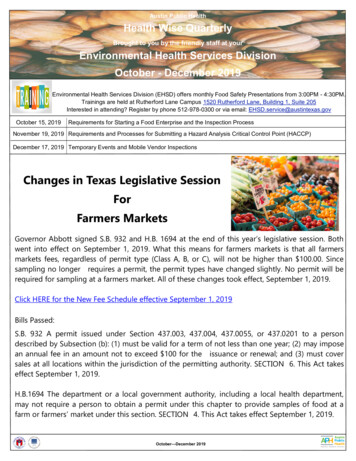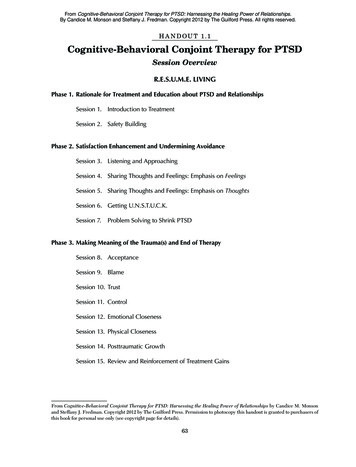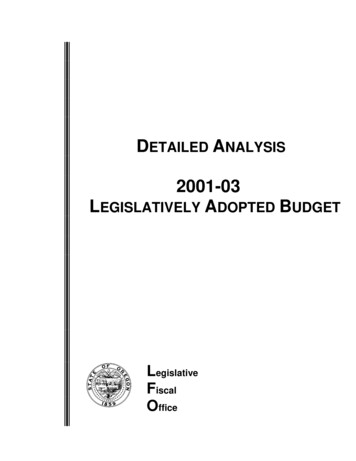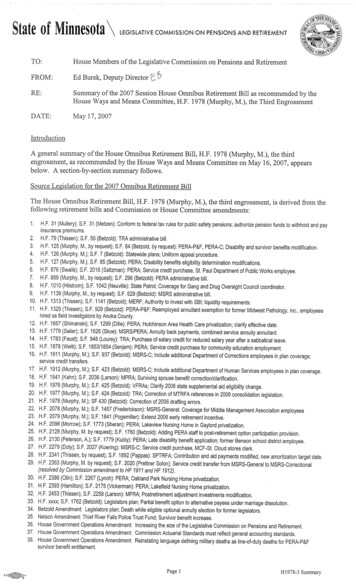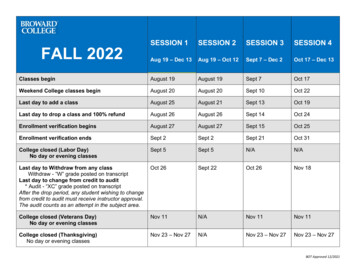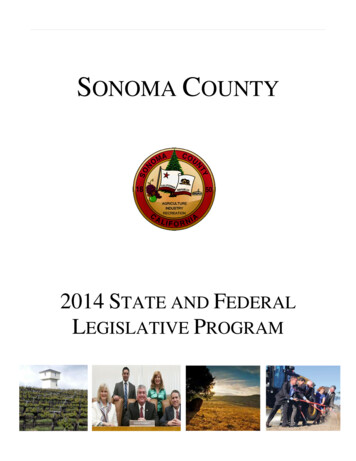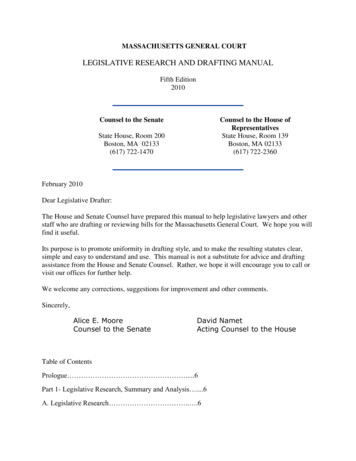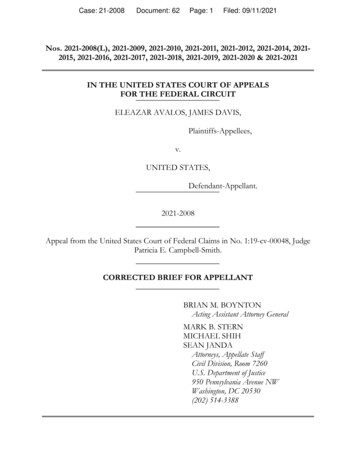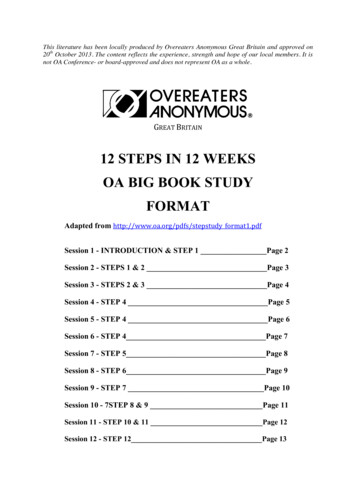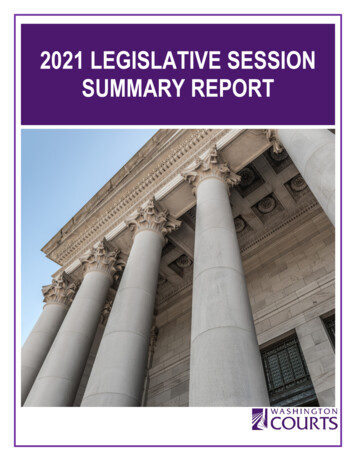
Transcription
2021 LEGISLATIVE SESSIONSUMMARY REPORT
Administrative Office of the CourtsPO Box 41170Olympia, WA 98504Dawn Marie Rubio, J.D.State Court Administrator(360) 357-2120 Officedawnmarie.rubio@courts.wa.govThe mission of the Administrative Office of the Courts is “toadvance the efficient and effective operation of the WashingtonJudicial System.”AOC has worked for more than 60 years tofulfill this mission for all levels of court.2
2021 LEGISLATIVE SUMMARYOn January 11, 2021, the legislature convened for a 105-day session. Prior to thestart of session, majority Democrats developed guidelines to focus the workload in avirtual session. They instructed their members to introduce no more than seven bills,and advised that bills would be more likely to advance if they had a clear path in theother chamber and fit into the following categories: address COVID-19 challenges;improve racial equity and police accountability; advance economic recovery; and addressclimate change. These guidelines were largely successful.By the first day of session, legislators had pre-filed 286 proposals (bills, resolutions,etc.), compared to 301 prefiled for the 2019 one-hundred and five-day session. As ofthe February 26 committee cutoff, legislators had introduced 1,177 proposals (627 inthe House and 550 in the Senate). By the end of the 2021 session, only 340 bills passedthe legislature. By contrast, past sessions have seen about 1200 bills introduced eachyear, with roughly 430 of those bills passing the legislature. Every bill introduced, butnot passed this session, will be considered again next session.Operating Budget . What had been a dire economic crisis only 14 months ago, turnedinto an unexpected robust state economy with the help of significant federal fundingand new revenues. The final budget was based on the Economic and Revenue ForecastCouncil’s March 2021 forecast, which projected an additional 1.3 billion in tax revenuethis biennium and an additional 1.9 billion increase forecasted for the 2021-23 budgetcycle. The increase in projected revenues leaves the state with a net surplus of nearly 3 billion - including reserves - at the end of the biennium. This puts Washington statenearly back on track with pre-pandemic economic growth, though the job marketstruggles in sectors hit hard by COVID closures.The House and Senate passed the final 59 billion operating budget (ESSB 5092) thefinal day of session. The budget includes 10 billion in federal funding, with 1 billion ofthat set aside in the Washington Rescue Plan Transition Account (WRPTA). The fundsfrom WRPTA can be used for responding to the impacts of the COVID-19 pandemicincluding those related to education, human services, health care, and the economy.Legislators left 500 million in the Budget Stabilization Account (aka, the Rainy DayFund). In addition, the federal Coronavirus Aid, Relief, and Economic Security (CARES)Act, signed into law on March 27, 2020, appropriated approximately 2.95 billion to stateand local governments in Washington state to help fund the response to the COVID-19outbreak. Overall, the budget makes significant expenditures in programs designed for3
economic recovery and to bolster public health efforts.Capital Budget: The legislature approved a significant capital budget that includedabout 189 million in Federal American Rescue Plan (ARP) funds. The budget includesfunding for several court projects, including: Trial Court Security Improvements: ( 750,000); Temple of Justice Enhancements (HVAC, lighting & water systems) ( 30,000,000).Transportation Budget: The legislature also approved a current revenuetransportation budget. It is anticipated that the legislature may return before next yearto enact a transportation budget with enhanced revenues.Judicial Branch Budget PrioritiesA number of the judicial branch priority budget requests were addressed by legislatorsduring the budget negotiations, including:2021 - 2023 Biennium : The 2021-2023 Operating Budget included general funds for: New Judge Position - King County: Funding was approved to add a 54th judge to theKing County Superior Court. The position was authorized January 1, 2021. AOC requiresfunding to pay the state share of salaries and benefits. ( 331,000). New Judge Position - Pierce County: Funding was approved for the ongoing costs ofa Pierce County Superior Court judge position. ( 331,000). Trial Court Funding Language Access: Funding was approved to expand the stateInterpreter Reimbursement Program to help additional courts, increase funds to courtsnow receiving assistance, and provide additional testing and training for qualifiedinterpreters. ( 2,726,000). LFO Calculator: Funding was approved to continue support of the Legal FinancialObligations (LFO) Calculator, a web-based tool that provides ready access to currentstatutes and case-law governing LFOs. Funding will go to continued maintenance andonline hosting of the calculator. ( 61,000). Responding to Behavioral Health Needs in the Court: Funding was approved todevelop a statewide court Behavioral Health Response Team to facilitate thedevelopment and implementation of a statewide response to individuals involved in thejustice system who have behavioral health needs and assist with therapeutic courts’evaluation efforts. ( 1,071,000). Trial Court Legal Services: Funding was provided for additional legal staff to assisttrial courts with legal research and analysis, updating legal reference materials, andtraining for judicial officers. ( 769,000).4
Web Services Support: Funding was approved for additional Web Services staffsupport, necessary to serve the increasing demand from multiple internal and externalstakeholders. ( 319,000). Court Equity and Access Team: Funding was approved to develop a statewide CourtEquity Access Team. This team will provide leadership and corresponding professionalexpertise and capacity to pursue and provide infrastructure and support for court systempolicy, planning, programming, and data collection and evaluation for critical services toensure equal access to civil justice, especially for unrepresented court users, low income,and those who come from historically marginalized backgrounds. ( 1,518,000).Judicial I nform ation System R equests: Legislators also approved several judicialbranch requests related to the Judicial Information System (JIS):Appellate Court Systems Operations and Maintenance (AC-ECMS):Funding wasapproved to establish permanent staffing for the Appellate Court Enterprise ContentManagement System and web pages. This includes: court records, data systems, eFiling,inmate eFiling, calendars, and court brief and opinion uploads. ( 2,000,000). CLJ-CMS:Funding was approved to continue the implementation of the newCommercial-Off-The-Shelf Case Management System (CMS) for the Courts of LimitedJurisdiction (CLJ) and probation offices. This will be the continuation of the replacementof the legacy Courts of Limited Jurisdiction Case Management System (sometimes knownas DISCIS). This is a multi-year, multi-million dollar effort. During the 2021 - 2023biennium, the project will focus on implementing electronic filing for all District andMunicipal Courts and probation departments statewide. ( 16,835,000). Internal Equipment Replacement: Juvenile Court Portfolio Enhancements: Funding was approved to expand AOC staffFunding was approved to replace end of lifeequipment and improve performance of heavily used JIS services. ( 2,503,000).to sustain support for and enhance the juvenile court application portfolio. ( 1,032,000).State General Fund Budget EnhancementsLegislators also provided general funds to the Judicial Branch for the following: SB 5160 Landlord Tenant Relations: Funding was approved for implementation of SB5160’s eviction resolution programs in partnership with Resolution Washington (DisputeResolution Centers). ( 9,010,000). Uniform Guardianship Act: Funding was approved to reimburse courts for costsincurred fulfilling attorney and court visitor needs created by the UGA. ( 8,000,000).5
Thurston County Impact Fee: Funding was approved for ongoing reimbursement toThurston County courts for the fiscal impact of state costs. ( 2,188,000).Blake LFO Aid Pool: Funding was approved to refund LFOs paid by defendants whoseconvictions or sentences were affected by the State v. Blake decision. ( 23,500,000). Blake Decision Court Expenses: Funding was approved to assist counties with costsrelated to the State v. Blake decision. ( 44,500,000). Review of Policy Bills with Potential Court or AOC ImpactEach legislative session, numerous Administrative Office of the Courts (AOC) andcourt staff screen, analyze, and monitor hundreds of bills for their potential impacton the business and operations of courts, AOC programs and services, and theJudicial Information System. While many of the bills introduced each legislativesession will not be enacted into law, every bill must be reviewed for potential impact.This document provides a high-level summary of bills that may have significant courtimpact or interest.Legislators passed several bills requested or supported by AOC and the judicialbranch entities, including: SHB 1531 (eliminating the expiration date for surchargeson court filing fees that are deposited into the Judicial Stabilization Trust Account)and HB 1167 (Thurston County Superior Court Judge).As you read though the following bill summaries, please do not hesitate to contactthe AOC with questions. You can find detailed information about a bill on thelegislature’s website by visiting https://app.leg.wa.gov/billinfo/ and entering the 4digit bill number. You can find information about the governor’s signature, veto, orpartial veto of bills at alactions/bill-action.6
Uniform child custody jurisdiction/enforcement actHB 1042Chapter 23, Laws of 2021Court Level(s): SuperiorCategories: Family/JuvenileEffective Date(s): 04/14/2021Allows courts to suspend application of Uniform Child Custody Jurisdiction and Enforcement Act(UCCJEA) standards in international child custody cases in which a parent or child’s country oforigin punishes homosexuality or failure to abandon ones religious or political beliefs (apostasy)by death, and a party shows a demonstrable risk of being subjected to such law.Police officers/tactics and equipmentESHB 1054Chapter 320, Laws of 2021Court Level(s): Superior, Juvenile, District/MunicipalCategories: Civil, CriminalEffective Date(s): 07/25/2021Prohibits a peace officer from using a chokehold or neck restraint in the course of his or her duties.Requires the criminal justice training commission to establish a work group to develop a modelpolicy for the training and use of canine teams. Prohibits the use of tear gas by peace officers orother employees unless necessary to prevent risk of serious harm posed by a riot, barricadedsubject or hostage situation. Creates specific standards for when tear gas can be used. Prohibitslaw enforcement agencies from acquiring or using military equipment. Requires all lawenforcement agencies to ensure uniformed peace officers are reasonably identifiable while onduty. Limits the use of vehicular pursuit by law enforcement to specific circumstances. Preventsa peace officer from firing a weapon at a moving vehicle unless necessary to protect against animminent threat of serious physical harm. Prohibits the court from issuing a warrant granting anexception to the requirement for the officer to announce his or her presence and purpose whenexecuting the warrant.Local government/criminal justice sales tax fundsE2SHB 1069Chapter 296, Laws of 2021 PVCourt Level(s): Superior, District/MunicipalCategories: CriminalEffective Date(s): 05/13/2021Allows local governments increased flexibility in use of existing revenue streams throughDecember of 2023 and permits Criminal Justice Sales Tax funds to be used for local governmentprograms aimed at reducing the number of individuals associated with the criminal justice system.7
NOTE: The Governor vetoed Sections 9, 17, and 18.Legal Aid Fund expenditure restrictionsHB 1072Chapter 58, Laws of 2021Court Level(s): SuperiorCategories: CivilEffective Date(s): 07/25/2021Removes restriction on civil legal aid fund expenditure; allows providers to assist litigants who arein the United States without legal authority.Private, for-profit detention facilitiesEHB 1090Chapter 30, Laws of 2021Court Level(s): Superior, JuvenileCategories: CriminalEffective Date(s): 04/14/2021Prohibits operating, contracting with or use of private detention facilities by persons, businesses,or local or state governments. Certain exceptions apply, including facilities providing treatment,medical services, rehabilitative services, mental health services, counseling or educational servicesto juveniles under Title 13 RCW.Reducing greenhouse gas emissionsE3SHB 1091Chapter 31, Laws of 2021 PVCourt Level(s): Superior, District/MunicipalCategories: Civil, Criminal, New/Amended CrimesEffective Date(s): 07/25/2021Creates a program intended to prompt the use of clean fuel technologies in order to reduce thecarbon intensity of fuel used in Washington. Amends several statues relating to energy andemissions, and expands civil penalties and gross misdemeanors for knowingly violating thestatutes, negligently releasing hazardous air pollutants, or failing to disclose potential conflicts ofinterest. NOTE: The Governor vetoed Section 3(8), which would have delayed the assignment ofcompliance obligations or the generation of credits under this chapter until a separate additivetransportation revenue act becomes law.8
Worker ProtectionsESHB 1097Chapter 253, Laws of 2021Court Level(s): SuperiorCategories: Civil, Other/InformationalEffective Date(s): 01/01/2022, except for section 3, which takes effect 07/1/2022.Allows an employer to contest an order restraining a condition of employment issued under RCW49.17.130(1) within 10 working days of the effective date of the order, by applying to the superiorcourt. Allows the director of the department of labor and industries to penalize an employer forviolating an order restraining a condition of employment and gives the employer 15 working daysto appeal. Adds any action that would deter an employee from exercising their rights in this actto chapter 49.17 RCW as a type of discrimination. Gives employees the right to appeal a directorsdecision in superior court and the court has jurisdiction to order appropriate relief includingrehiring or reinstatement of the employee with back pay. Creates an appeals process through theboard of industrial insurance, but remedies may be pursued in superior court that fall outside ofthe board industrial insurance jurisdiction.School attendance/truancy petitionsESHB 1113Chapter 119, Laws of 2021Court Level(s): Superior, JuvenileCategories: Family/Juvenile, FormsEffective Date(s): 04/26/2021, except for sections 7 through 15, which become effective08/01/2021.Amends school attendance requirements, and allows use of tiered support system to preventabsences and support students and families. Community Truancy Board name changed to“Community Engagement Board”. Requires school districts to file truancy petition after 7thunexcused absence in one month and by the 15th unexcused absence in one year.Juveniles/access to attorneysESHB 1140Chapter 328, Laws of 2021Court Level(s): Superior, JuvenileCategories: CriminalEffective Date(s): 01/01/2022Requires juveniles have access to an attorney (by phone, in-person or via video) when contactedby law enforcement, before the youth waives any constitutional rights. Unless subject to anexception, this applies to questioning during custodial interrogation, detainment on probablecause related to commission of a crime, and requests to submit to an evidentiary search.9
Consultation with an attorney may not be waived. Statements made prior to consulting with anattorney in such circumstances are inadmissible in juvenile or adult court with certain exceptions.Emergency Communications Systems/tax fundingSHB 1155Chapter 297, Laws of 2021Court Level(s): Superior, District/MunicipalCategories: Other/InformationalEffective Date(s): 07/25/2021Requires counties with a population over 1.5 million imposing the emergency communicationssales and use tax, and any city within that county with a population over 50,000, to enter into aninterlocal agreement with regard to distribution of the revenue from the tax. If a city and countycannot reach agreement within the allotted timeframe either may seek apportionment in thecounty’s superior court.Thurston County Superior Court/9th judgeHB 1167Chapter 63, Laws of 2021Court Level(s): SuperiorCategories: Other/Informational, Salaries/Benefits/Personnel/HREffective Date(s): 07/25/2021Increases the number of judges on the Thurston County Superior Court bench from 8 to 9. Thenew judicial position is effective November 1, 2021 if the local legislative authority approves andcontracts to pay county portion of associated costs.Child support withholding/federal requirementsSHB 1171Chapter 35, Laws of 2021Court Level(s): SuperiorCategories: Family/JuvenileEffective Date(s): 07/25/2021, except for section 14, which is effective 02/01/2021.Amends child support income withholding provisions to comply with federal child support programrequirements. Changes writ of garnishment language, eliminates the ability to seek prejudgmentgarnishment under RCW 6.26, and requires DCS to use income withholding forms created by thefederal Department of Health and Human Services to initiate withholding action.10
Juveniles rehabilitation/community transition servicesE2SHB 1186Chapter 206, Laws of 2021Court Level(s): Superior, JuvenileCategories: Family/Juvenile, Other/InformationalEffective Date(s): 07/25/2021, except for sections 1 through 6, 8 and 9, which are contingent.Directs DCYF to create the Community Transitions Services Program to provide therapeuticcommunity transition services and supports for youth. Eligible individuals who have served atleast 60 percent of a term of confinement, and at least 15 weeks of total confinement, may betransitioned to community confinement for the remainder of their term while under DCYFmonitoring with regard to location and services. In the event of a violation, or if the Departmentdetermines placement in the program is no longer in the individuals best interests, they may bereturned to the Department operated institution.Youth counseling/dependency2SHB 1219Chapter 210, Laws of 2021Court Level(s): Superior, Juvenile, AOCCategories: Family/Juvenile, FormsEffective Date(s): 07/25/2021Mandatory appointment of counsel for children 8 years of age and older who are involved independency proceedings will be phased in beginning with implementation in at least threecounties July 2022 until statewide implementation by January 2027. Child representationstandards will be updated and recommendations for representation of children under 8 years ofage will be submitted to the legislature March 2022. The Office of Civil Legal Aid is responsiblefor the child representation program and the Washington State Center for Court Research willprovide an evaluation and annual report.Standardizing homelessness definitionsSHB 1221Chapter 67, Laws of 2021Court Level(s): Superior, JuvenileCategories: Family/Juvenile, FormsEffective Date(s): 07/25/2021Added a definition homelessness to certain statutes related to juveniles that include situations inTitle 42 U.S.C., chapter 19, subchapter I.11
Electronic recording of custodial interrogationsSHB 1223Chapter 329, Laws of 2021Court Level(s): Superior, Juvenile, District/MunicipalCategories: Civil, CriminalEffective Date(s): 07/25/2021, except for Sections 1 though 20, which take effect 01/01/2022.Requires electronic recording of custodial interrogations for felony and juvenile offenses. Requiresa custodial interrogation at a jail, police or sheriff's station, holding cell, or correctional ordetention facility to be recorded by audio and video means. Allows an officer to prepare a writtenor electronic report after failing to record all or part of a custodial interrogation to explain thecircumstances. Creates various exceptions and allows the individual subject to the custodialinterrogation the option to give a statement without a recording. Requires the prosecutor, thatintents to use an unrecorded custodial statement, to provide written notice of an exception andprove by a preponderance of the evidence that an exception applies. Provides guidelines for thecourt to consider whether the failure to record all or part of a custodial interrogation resulted ina statement that was voluntary. Allows the defendant the opportunity to present evidence to thejury an admitted statement was not recorded electronically in compliance with this act. Prohibitscivil liability for damages against a governmental entity when a law enforcement agency createsprocedures to implement this act and specifies there is no private cause of action against anindividual officer. Provides self-authentication of the recorded custodial statement if accompaniedby a sworn statement from the officer affirming authenticity.Eviction cause/notice requirementsESHB 1236Chapter 212, Laws of 2021Court Level(s): SuperiorCategories: CivilEffective Date(s): 05/10/2021Creates several “cause” requirements for when a landlord may evict a tenant, refuse to continuea tenancy, or end a periodic tenancy. Creates various definitions and notice timelines for these“cause” requirements. Directs the landlord to provide notice to all other occupants of a residenceafter the tenancy is ended, requiring the other occupants to apply to become a tenant or vacate.Allows the landlord to be penalized the greater of three times the monthly rent or damagessuffered by the tenant in a wrongful eviction. Changes the standard from “deliberately” to“knowingly” for a tenant to recover damages for a prohibited provision in the rental agreement.Increases maximum damages to two times the monthly rent.12
Court and county level operations/COVID-19 pandemicEHB 1271Chapter 122, Laws of 2021Court Level(s): AllCategories: Other/informationalEffective Date(s): 07/25/2021, except for section 10, which takes effect 07/01/2022.Allows county level operations to continue uninterrupted during COVID without barriers. Allowsclerks of all levels of courts to attend proceedings virtually, state auditor to extend annual fiscalreport filing deadlines for local governments, DMV to allow coroners access to negative files toidentify deceased persons, adds a definition of “public auction sale by electronic media” underRCW 6 in enforcement of judgments, and requires posting of sale and sheriff statement on websiteof auction sale host for the sale of real estate.Eviction prevention services/recorded document surchargeE2SHB 1277Chapter 214, Laws of 2021Court Level(s): District/MunicipalCategories: Accounting, Civil, JIS, Other/InformationalEffective Date(s): 07/25/2021A new surcharge of 100 must be charged by the country auditor for each document recorded,except those documents listed in section 1(2) of the act. The surcharge is in addition to any othercharge of surcharge allowed by law. The surcharge also applies when district court clerks fileName Change Petitions with the county auditor.Misdemeanant supervision/interlocal agreementsSHB 1294Chapter 41, Laws of 2021Court Level(s): District/Municipal, AOCCategories: Criminal, Other/InformationalEffective Date(s): 07/25/2021Allows courts of limited jurisdiction to enter into interlocal agreements for probation supervisionservices including pretrial and/or post-judgment probation supervision services for one or morespecific cases. Clarifies that courts need not require the referral of all supervised cases by thejurisdiction and may limit the referral for services to a single case. Requires that agreements beapproved by the presiding judge of each participating court and may not require approval of theexecutive and legislative bodies of each jurisdiction unless there is additional expenditure of fundsby the jurisdiction. Requires that all proceedings to grant, modify, or revoke probation must beheld in the court that imposes probation supervision. Specifies that jail costs and the cost of othersanctions remain with the jurisdiction that imposes probation services. Allows the AOC to create13
a model interlocal agreement in cooperation with the District and Municipal Court JudgesAssociation and the Washington Association of Prosecuting Attorneys.Institutional education programsE2SHB 1295Chapter 164, Laws of 2021Court Level(s): Superior, JuvenileCategories: Family/JuvenileEffective Date(s): 07/25/2021Directs OSPI and DCYF to create joint recommendations regarding creation, funding andimplementation of a reformed institutional education system for youth in or released from securefacilities. Creates an advisory group, to include juvenile court administrators, to examineeducation access and delivery, data collection, reporting and facility policies.Regional transit authority/fare enforcementSHB 1301Chapter 70, Laws of 2021Court Level(s): AOCCategories: Other/InformationalEffective Date(s): 07/25/2021Authorizes regional transit authorities (such as Sound Transit) to create alternative fareenforcement systems, which may include issuing notices of violation, in addition to or as areplacement for the schedule of fines and penalties currently in place for civil infractions.Permissible use of force by police/correctionsE2SHB 1310Chapter 324, Laws of 2021Court Level(s): Superior, Juvenile, District/MunicipalCategories: CivilEffective Date(s): 07/25/2021Specifies instances when a peace officer may use physical and deadly force against a person andrequires the use of reasonable care when determining whether to use physical force. Requiresde-escalation tactics whenever possible and provides examples of such tactics. Directs peaceofficers that use physical force to use the least amount of physical force necessary to overcomeresistance under the circumstances, terminate the use of physical force as soon as the necessityfor such force ends, and when possible, use available and appropriate less lethal alternativesbefore using deadly force. Requires the attorney general to develop and publish model policieson law enforcement's use of force and de-escalation tactics by 07/01/2022, and requires all lawenforcement agencies to adopt policies consistent with the model policies and submit copies of14
the applicable policies to the attorney general. Mandates various additional law enforcementtraining to carry out the intent of this act.Civil Protection OrdersE2SHB 1320Chapter 215, Laws of 2021Court Level(s): Superior, District/Municipal, AOCCategories: Civil, Forms, JIS, Other/InformationalEffective Date(s): 07/01/2022, except for sections 12, 16, 18, 25, and 36, which take effect07/25/2021.Consolidates all six civil protection order case types under a single chapter (domestic violence,sexual assault, stalking, anti-harassment, vulnerable adult and extreme risk protection orders).Provides general uniformity in rules and procedures across protection order types and modernizesprocesses. Mandates creation of a single petition that may be used to file for any type of protectionorder. Authorizes hearings to be conducted in person or by telephone, video or other electronicor remote means. Adds provisions governing electronic submission of petitions and case trackingby parties. Allows service by electronic means in certain circumstance. Revises existing firearmsurrender, possession and revocation requirements and domestic violence no-contact orderprovisions.Off-Road vehicle/snowmobile registration enforcementSHB 1322Chapter 216, Laws of 2021Court Level(s): Superior, District/MunicipalCategories: Accounting, Criminal, JIS, New/Amended CrimesEffective Date(s): 10/01/2021Removes an exemption for registration of off-road vehicles and snowmobiles owned by residentsof another state if that state borders Washington and does not impose a retail sales and use tax.Requires no fee for off-road vehicle decals owned by residents of other states if the vehicle isproperly registered. Clarifies that certain out-of-state applicants for an off-road vehicleregistration do not have to pay the registration fee but may have to pay a transaction fee collectedby subagents. Expands an existing gross misdemeanor for registering an off-road vehicle orsnowmobile in another state to avoid retail sales tax, and adds a fine of four times the amount ofavoided taxes and fees for second or subsequent offenses.Unlawful racial restrictions in recorded documentsE2SHB 1335Chapter 256, Laws of 2021Court Level(s): Superior15
Categories: Civil, Other/InformationalEffective Date(s): 07/25/2021Requires the University of Washington and Eastern Washington University to review recordedcovenants and deed restrictions to identify recorded documents that include racial or otherunlawful restrictions on property ownership and provide the property owners with information onhow to petition the superior court to have the unlawful restriction removed. Requires a completecopy of any document affected by an order striking void provisions to be made an exhibit to theorder. Requires the order to identify each document and state verbatim the void provisions.Requires the order to physically redact void provisions on a certified copy of each document.Directs the petitioner to file the order with the auditor.Health care workforce eligibility/criminal recordsSHB 1411Chapter 219, Laws of 2021Court Level(s): Superior, District/MunicipalCategories: Civil, Other/InformationalEffective Date(s): 07/25/2021, except section 6, which takes effect 07/1/2022.Prevents the department of social and health services (DSHS) from automatically disqualifying aperson, based on certain criminal conv
Responding to Behavioral Health Needs in the Court: Funding was approved to develop a statewide court Behavioral Health Response Team to facilitate the development and implementation of a statewide response to individuals involved in the justice system who have behavioral health needs and assist with therapeutic courts' evaluation efforts.

